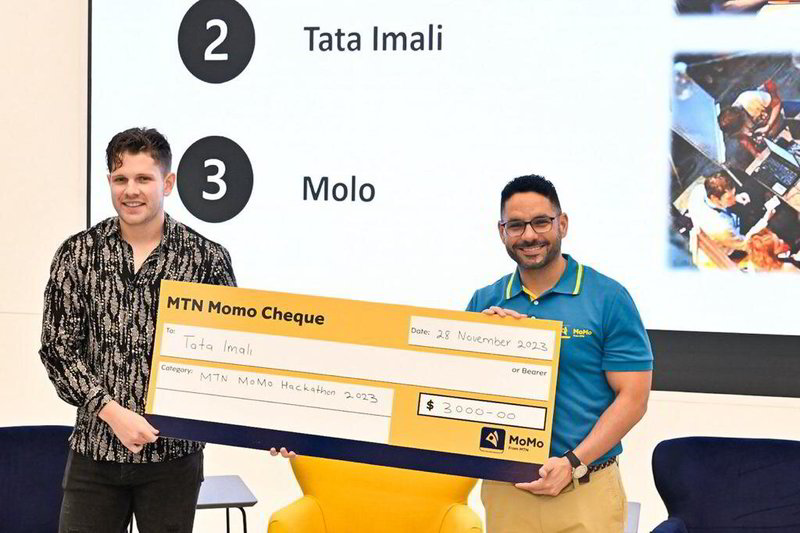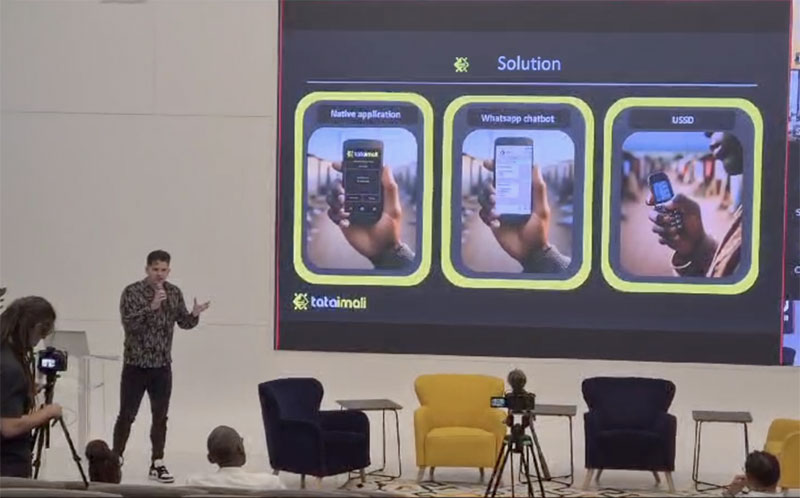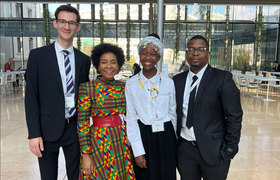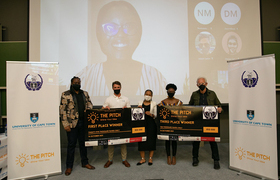UCT students win second place in MTN MoMo API Hackathon 2023
11 December 2023 | Story Thandile Xesi. Photos Supplied. Read time 5 min.
A team of three University of Cape Town (UCT) students took home second-place in the MTN MoMo API Hackathon 2023, a prize worth US$3 000 (approximately R56 000).
The students are Gregory Andrews, Donel Chihoma and Francisco Rutayebesibwa, all MPhil in Financial Technology students. The hackathon, which was open to South Africans for the first time, fosters financial inclusion and literature across Africa. The competition ran from 31 July to 9 October. The team’s innovative solution, Tata-iMali, is a crowd-funding platform that provides micro-lending services to low-income earners who do not have a credit history. The team was commended by the judges for its technical excellence and practicality. The 2023 competition yielded three stellar winners out of 12 finalists: Zaka, Tata-iMali, and MoLo. Each platform offered unique solutions to key financial challenges – from cashflow financing to peer-to-peer (P2P) lending. According to the judges, these top developers demonstrated exceptional prowess in designing solutions that transcend payment processing, incorporating innovative features that address the unique financial needs of their registered markets.
The winners were selected based on their creativity, potential impact, and ability to advance MTN’s mission of building a pan-African fintech platform.
Trailblazing problem solver
Andrews, the chief executive officer (CEO) and founder of Tata-iMali, said “Our decision to participate in the hackathon was driven by our alignment with MTN’s mission of fostering digital and financial inclusion, which strongly resonates with Tata-Imali’s core values.”
He added, “The development of our innovation was a complex and iterative process, integrating cutting-edge financial technology with the specific needs of our target market. It involved technical aspects, such as blockchain development and the fine-tuning of machine-learning models for credit scoring, as well as people-centric elements like conducting on-the-ground user research in KwaLanga.”

To fulfil these complex roles, Andrews teamed up with Chihoma, the chief operating officer (COO), while Rutayebesibwa, performed the role of chief technology officer (CTO. The team remained committed to disrupting the financial industry, displaying exceptional problem-solving abilities, analytical prowess, and technological savvy.
Bradwin Roper, the CFO at MTN SA, emphasised the role of these solutions in empowering previously underserved communities.
“The MTN MoMo platform offers consumers and businesses easy access to various innovative digital financial services. In South Africa alone, over eight million people are registered on the MTN MoMo platform. This massive user base makes it ideal for local talent, developers, companies, and entrepreneurs to unlock economic growth through financial and digital solutions in their communities.”
Challenges and possibilities
Rutayebesibwa said that implementing a sophisticated technology stack, developing a secure and efficient stablecoin, and delivering an easy-to-use interface for a diverse user base were no small feat.
“One significant challenge was ensuring seamless integrations with different third-party libraries and developing a user-friendly interface for individuals with limited digital proficiency,” he said. “Creating a stablecoin for transparent and cost-effective transactions were also critical milestones.”
Thinking ahead, Chihoma envisions a future where Tata-iMali becomes a pan-African player in the fintech space, using unconventional data to provide greater financial access for underserved communities.
“We have ambitious plans to introduce Tata-iMali not only in South Africa but across the African continent,” he said. “Our expansion involves diversifying the data sources used to predict credit scores, incorporating elements like electricity usage and other relevant indicators of human behaviour.”
 This work is licensed under a Creative Commons Attribution-NoDerivatives 4.0 International License.
This work is licensed under a Creative Commons Attribution-NoDerivatives 4.0 International License.
Please view the republishing articles page for more information.










